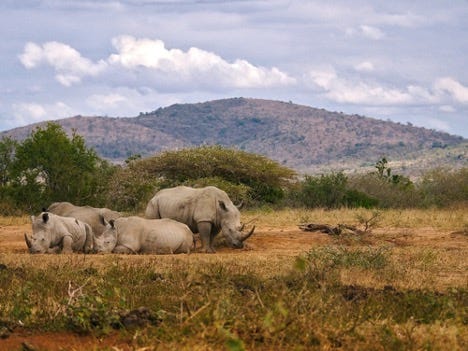Rhinos have become an icon of Africa but, as is known by anyone paying attention, they are critically endangered. The population has been decimated in the last century, with only an estimated 27,000 rhinos total remaining, down from well over half a million at the beginning of the 20th century.
Conservation efforts across Africa work diligently to stop the slaughter of rhinos by poachers who hack off the ivory horns and leave the rhino to die in the bush. The ivory is then sold primarily in Asia as a folk remedy and decoration. A senseless death. In Saving the Last Rhinos: The Life of a Frontline Conservationist, Grant Fowlds and Graham Spence give you an inside glimpse at what it’s like trying to stop the daily slaughter.
Fowlds is a conservationist from South Africa with a deep passion for the African wild and the animals that call it home. Having begun life farming, he turned to conservation efforts as a young man – a career that has taken him all over the African continent to try like hell to save the remaining rhinos.
His primary work has been in creating game reserves in South Africa and the Democratic Republic of the Congo. These game reserves provide protection and space for large wild animals, while generating tourism, awareness, and funding for conservation efforts.
Saving the Last Rhinos is a chronology of Fowlds life across his varied conservation career. He shares the struggles of urban encroachment on the destruction of wild habitats in Africa. The challenges of working across governments in Africa. And, of course, the horrific reality of what poachers are doing to animals on a daily basis across the continent.
This is a fascinating book in the sense of the topic. I knew little about conservation efforts outside of what I see on the nature documentaries I watch on Netflix, and it was interesting to get a new perspective from someone doing the work.
That said, I didn’t love the book. It felt too chronological, as though he was telling each and every story from his life, unedited and without much regard for presenting an engaging narrative that is required for a great book. It was informative, but got a bit bland halfway through. Overall, an interesting read.
Published: May 2020
Publisher: Pegasus Books
Format: Hardcover
If you think this sounds interesting, bookmark these other great reads:
Scientist: E. O. Wilson: A Life in Nature by Richard Rhodes (2021) | Read my review
On All Fronts: The Education of a Journalist by Clarissa Ward (2020)
This post contains affiliate links, allowing me to earn a small commission when you purchase books from the link provided. There is no cost to you, and this will allow me to keep this newsletter free and open to all. Happy reading!






